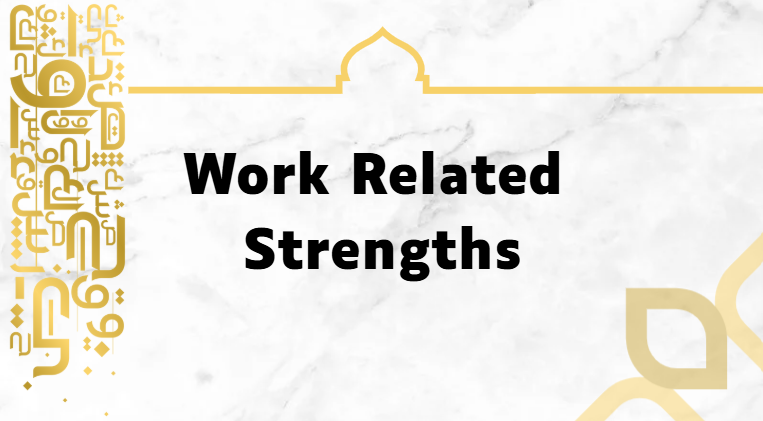Every job requires different skills, but some personal strengths can help you shine in any workplace. Understanding your work-related strengths can make you more confident, productive, and successful. In this article, we’ll explore what work strengths are, why they matter, and how to identify and improve them.
What Are Work Related Strengths?
Work-related strengths are the natural abilities and qualities that help you perform your job well. They include both technical skills (like computer knowledge) and soft skills (like communication and teamwork).
These strengths make you stand out from others and help you grow in your career. They also guide you to choose the right kind of work where you can be most effective and satisfied.
Why Work Related Strengths Are Important
Your strengths are what make you valuable at work. They allow you to:
- Work more efficiently – You can do tasks faster and better.
- Build confidence – You know what you’re good at and can rely on your skills.
- Improve teamwork – You contribute to the team’s goals effectively.
- Advance your career – Strengths help you qualify for promotions or new opportunities.
- Increase job satisfaction – Doing what you’re good at makes work more enjoyable.
When you use your strengths daily, your performance and happiness increase naturally.
Top 10 Common Work Related Strengths
Here are some of the most valuable strengths employers look for:
1. Communication Skills
Being able to clearly express ideas and listen to others is key to success in any job. Good communication helps avoid confusion and improves relationships with coworkers and clients.
2. Teamwork
Working well with others is a major strength. Team players understand how to cooperate, share ideas, and support their teammates.
3. Problem-Solving
Every job comes with challenges. Employees who can find quick and creative solutions are always in demand.
4. Adaptability
Work environments change often. Being flexible and open to change shows you can handle new situations smoothly.
5. Time Management
Strong time management helps you prioritize tasks and meet deadlines without stress.
6. Leadership
Even if you’re not a manager, leadership means taking responsibility, motivating others, and setting a good example.
7. Attention to Detail
This strength means you notice small things that others might miss, ensuring accuracy and quality in your work.
8. Creativity
Creative employees can think outside the box, come up with fresh ideas, and improve work processes.
9. Emotional Intelligence
Understanding and managing emotions — both yours and others’ — helps build better professional relationships.
10. Work Ethic
Having a strong work ethic means being honest, reliable, and dedicated to doing your best every day.
How to Identify Your Work Related Strengths
You can find your strengths in several ways:
- Self-Reflection: Think about what tasks you enjoy and excel at.
- Feedback: Ask your coworkers, friends, or managers what they think you do best.
- Performance Reviews: Look at past reviews or achievements to see which skills were praised.
- Personality Tests: Tools like StrengthsFinder or Myers-Briggs can help you discover your strengths.
When you know your top strengths, focus on using them more in your daily tasks.
How to Improve Your Work Strengths
Even if you already have strong skills, there’s always room for growth. Here are a few ways to improve:
- Take training courses to upgrade your knowledge.
- Practice regularly to make your skills stronger.
- Set personal goals to challenge yourself.
- Learn from feedback and accept constructive criticism.
- Observe others who are great at the skill you want to develop.
With consistent effort, your strengths can become your greatest professional assets.
Using Your Strengths in Job Interviews
When applying for a job, highlighting your strengths can help you stand out.
Here’s how to do it:
- Give real examples. Instead of just saying “I’m a good communicator,” share a story showing how you solved a problem using communication.
- Match strengths to the job. Pick strengths that fit the position you’re applying for.
- Be confident but humble. Show pride in your abilities without sounding arrogant.
Employers appreciate candidates who know their strengths and use them effectively.
Balancing Strengths and Weaknesses
Everyone has both strengths and weaknesses. The key is to manage your weaknesses while focusing on what you do best. For example, if you struggle with time management but excel in creativity, use your creativity to find new ways to plan your day.
Balancing both sides helps you become a well-rounded and reliable worker.
Real-Life Example of Work Related Strengths
Let’s take an example:
Sara, a project manager, has strong organization, communication, and problem-solving skills. She uses these strengths to lead her team, complete projects on time, and handle unexpected challenges.
Because Sara knows her strengths, she focuses on improving them and continues to grow in her role.
Final Thoughts
Knowing and developing your work-related strengths is one of the best ways to succeed in your career. These strengths help you perform better, build confidence, and enjoy your job more. Whether you’re starting a new career or improving in your current role, your strengths are the foundation of your success.
FAQs
Q1: What are examples of work-related strengths?
A: Some examples include teamwork, communication, leadership, adaptability, problem-solving, and creativity.
Q2: How can I find my work strengths?
A: You can identify them through self-reflection, feedback from others, and performance reviews.
Q3: Why should I know my strengths?
A: Knowing your strengths helps you choose the right job, perform better, and grow faster in your career.
Q4: Can I improve my work strengths?
A: Yes! You can strengthen your abilities with practice, training, and by learning from others.
Q5: How do strengths help in job interviews?
A: They help you show employers what makes you valuable and why you’re a perfect fit for the job.


